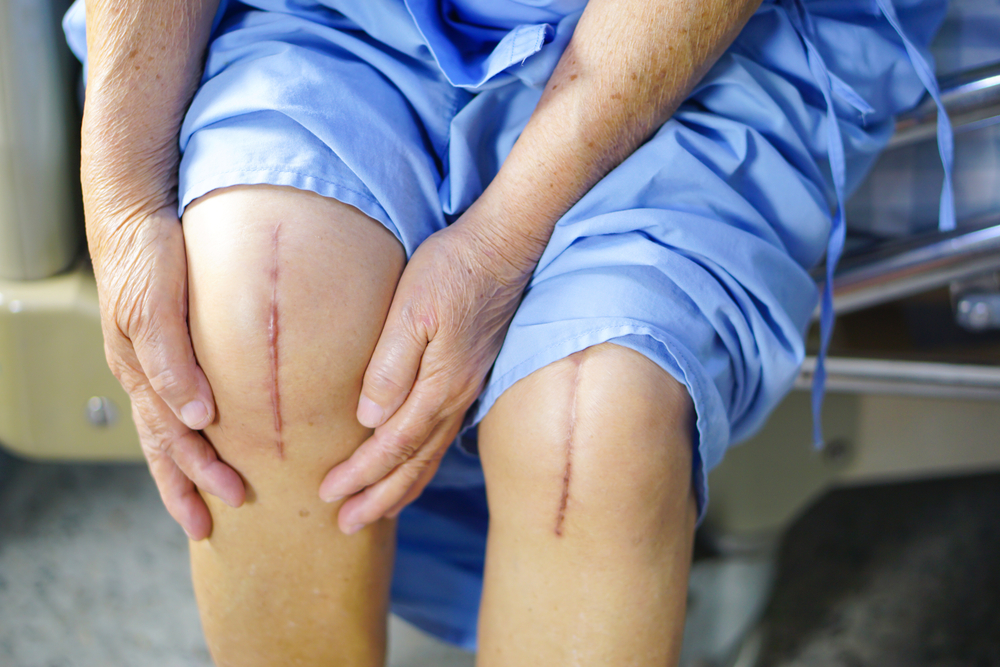Car accidents are traumatic events for everyone involved and can lead to various types of injuries. One such injury that can occur as a result of the impact of a car accident is a knee injury. Types of knee injuries can also vary from severe cuts and lacerations to burns, soft tissue damage, dislocations, and more. Knee injuries are not only painful, but some injuries may be also more severe and lead to long-term complications that physically affect your life.
Some knee injuries may even require surgery. If you have suffered a car accident and injured your knee, you may be wondering, “Do I need knee surgery?” Experienced accident injury doctors at AICA can help determine treatment options after a knee injury, including whether or not surgery is required.
Types of Knee Injuries
 Knee injuries can occur at any time, from walking, running, playing sports, or more. Athletes often experience knee injuries because of overexertion. Car accidents are one of the most common causes of knee injuries in adults. The external force applied to the body during a car accident is what will cause a knee injury. These are the common types of knee injuries that occur from car accidents.
Knee injuries can occur at any time, from walking, running, playing sports, or more. Athletes often experience knee injuries because of overexertion. Car accidents are one of the most common causes of knee injuries in adults. The external force applied to the body during a car accident is what will cause a knee injury. These are the common types of knee injuries that occur from car accidents.
Laceration
Broken glass and debris can cause injury during a car accident. Glass or sharp objects can cause cuts or scrapes. Debris of any kind can still cut through long pants causing pain and injury. Some lacerations may require stitches, but most will heal on their own.
Contusion
High-impact car accidents cause parts of the body to bang against the car’s dashboard, steering wheel, doors, or other hard surfaces. When the knee strikes a hard surface, it can lead to a contusion, which is damage to the soft tissue of the knee.
Dislocation
Dislocation of the knee is an extremely painful injury that would require immediate medical attention. The first step a doctor must take is to put the kneecap back into the proper place. The knee must be immobilized to keep it from bending while healing. There is a risk of reinjury after a knee dislocation. Knee dislocations that also cause damage to the arteries may require surgery.
Broken Kneecap
Striking the knee against a hard surface of the car can also lead to a fractured patella or broken kneecap. This moveable bone at the front of your knee protects the joint behind it. If the kneecap is broken but hasn’t moved out of place, only a brace is required as the fracture heals. However, if bone pieces are out of place, surgery is required to correct bone placement. Recovery time can take six to eight weeks.
Tibial Plateau Fracture
The tibial plateau is a part of the knee joint. It supports weight during movement. This knee injury can happen during a car accident when the knee is crushed or pinned. This type of accident can also cause further damage to the tendons, ligaments, cartilage, or muscles in the knee. Imaging tests such as a CT scan, MRI, or X-Ray can show what damage was incurred as a result of the accident. If images show only a minor fracture with no movement of bone, surgery isn’t likely needed to repair the injury. If bones are displaced or the knee is otherwise considered unstable, then surgery may be required.
Anterior Cruciate Ligament (ACL) Injury
Landing wrong on your knee can cause damage to the ACL, one of two ligaments in the middle of the knee that connects your thigh bone to your shin bone. It is the result of hyperextension of the knee during a catch, and a popping sound is usually heard. Depending on the severity of the injury, surgery may be required right away. Mild injuries will usually heal with anti-inflammatory medication, immobility and stabilization with a knee brace, and physical therapy. Severe tears require surgery and up to a 4- to 6-month recovery time.
Posterior Cruciate Ligament (PCL) Injury
This strong ligament in the body extends from the top rear of the tibia bone to the bottom of the femur. This type of injury is commonly known as the “dashboard injury,” as it is common when a bent knee hits the dashboard of a car during an accident. In most instances, rest is required for 6 to 8 weeks, along with immobilization of the knee with a brace. Physical therapy could be recommended. In severe instances, such as a complete tear, surgery may be required.
Medial Collateral Ligament
This ligament also connects from the tibia to the thigh bone. It is the most common injury that will occur as a result of the knee striking the dashboard. In most instances, the tear is minor and won’t require surgery. Rest and elevation are advised for recovery, which can take anywhere from a few weeks to a few months.
Muscular Injuries
Trauma from a car accident can lead to minor muscular injuries such as tendon strains or muscle strains. These types of injuries can cause swelling, bruising, muscle spasms, or a decrease in mobility. Most of these injuries can be treated with the RICE method, rest, ice, compression, and elevation. Anti-inflammatory medication can also aid in the recovery process. If a tendon has ruptured, then surgery may be required to repair the tendon.
Cartilage Injuries
There are two pieces of cartilage in the knee that provide padding between the femur and tibia. The job of the cartilage pieces is to keep the joints from rubbing against one another, causing damage and pain. These two pieces of cartilage, known as the medial meniscus and lateral meniscus, can be injured if the knee is twisted or rotated improperly. A torn meniscus will cause swelling, pain, stiffness, and decreased range of motion. Like other injuries, mild tears can be treated at home, while severe tears could require surgical repair.
Symptoms of a Knee Injury
Knee injury symptoms will vary significantly depending on the severity of the car accident. Accidents that cause the knee to strike the dashboard or end up in an awkward position are more likely to cause injury. Symptoms of a knee injury can include:
- Pain – Likely, your knee will hurt when you move it or touch it after an injury
- Reduced range of motion – The knee may not be able to move as normal, indicating you have suffered an injury
- Bruising and discoloration – underlying knee injuries can cause skin discoloration, such as a reddish color. Some injuries may also have a yellow or greenish hue.
- Change in skin temperature – The body’s automatic response is to respond to an injury, and this response can result in a change of temperature, causing the skin to feel warm to the touch. On the other hand, knee injuries that affect blood circulation could cause the skin to feel cold
- Swelling – The injured knee may look larger than your other knee as a result of swelling of the injured area
- Inability to bear weight on the affected knee
When Should I See a Doctor?
The knee joint is one of the largest and most complicated joints in the body. The complexity of the joint is one reason why it is prone to a wide array of injuries. Knee injuries resulting from a car accident are common, but not all knee injuries are recognized right away. As soon as you recognize symptoms of a knee injury, it is important that you get in to see a doctor right away. Even when injuries from a car accident seem minor and you don’t feel you need to get in to see a doctor, it is still recommended that you take the time to seek medical attention. So be sure to make it a priority to see a doctor soon after your accident. The sooner you receive medical attention, the sooner you can be on the road to recovery.
Diagnosis of a Knee Injury
 One of the best ways to determine if knee surgery is required is to receive a proper diagnosis. Using state-of-the-art imaging technology at AICA in Lithia Springs, doctors can take a close look at the injury to provide a specific diagnosis. CT scans, MRIs, and X-rays are just a few of the imaging tools that a doctor may utilize to get a really good look at the knee joint and the surrounding areas. During the examination, the doctor may press lightly upon the injury to determine areas of pain. They may also ask questions about the specifics of how the knee was injured or ask about what limitations you are experiencing. After collecting all the information, the doctor will be able to determine a diagnosis and move forward with a treatment plan. In minor instances, rest and working with a physical therapist may be all that is required. For severe injuries, surgery could be required, followed by rest and recovery. You can expect your doctor to provide detailed information about your injury and what to expect for the recovery process.
One of the best ways to determine if knee surgery is required is to receive a proper diagnosis. Using state-of-the-art imaging technology at AICA in Lithia Springs, doctors can take a close look at the injury to provide a specific diagnosis. CT scans, MRIs, and X-rays are just a few of the imaging tools that a doctor may utilize to get a really good look at the knee joint and the surrounding areas. During the examination, the doctor may press lightly upon the injury to determine areas of pain. They may also ask questions about the specifics of how the knee was injured or ask about what limitations you are experiencing. After collecting all the information, the doctor will be able to determine a diagnosis and move forward with a treatment plan. In minor instances, rest and working with a physical therapist may be all that is required. For severe injuries, surgery could be required, followed by rest and recovery. You can expect your doctor to provide detailed information about your injury and what to expect for the recovery process.
What to Expect from Knee Surgery
 Should you experience a knee injury that does require surgery, it can sound daunting. What type of knee surgery do I need, what will the recovery look like, and is it a safe process? These may be just a few of the questions that are running through your head. Thankfully, working with expert doctors and surgeons who have access to new technology can make the process safer than ever. With robotic technology, surgeons are able to prepare the injured knee with precision and care. New medical procedures, such as the use of neuromuscular electrical stimulation, can also help as surgeons can manipulate and control muscles during surgery.
Should you experience a knee injury that does require surgery, it can sound daunting. What type of knee surgery do I need, what will the recovery look like, and is it a safe process? These may be just a few of the questions that are running through your head. Thankfully, working with expert doctors and surgeons who have access to new technology can make the process safer than ever. With robotic technology, surgeons are able to prepare the injured knee with precision and care. New medical procedures, such as the use of neuromuscular electrical stimulation, can also help as surgeons can manipulate and control muscles during surgery.
Depending upon the type of surgery being performed, regional anesthetics can be applied, or local anesthetics may be used for arthroscopic surgery. Once the knee has been prepped and the patient is given anesthetics, surgeons can focus on repairing the knee. In the case of a full knee replacement, metal implants will be placed to substitute the surface of the joint. A space is placed between the metal supports and the kneecap inserted. The goal of surgery is to restore the range of motion and prevent re-injury. After initial recovery following surgery, patients will undergo physical therapy to strengthen the knee, improve mobility, and restore proper function.
Will My Lifestyle Change?
Thankfully, for most knee injuries, a lifestyle change will be short-lived as you go through the recovery process. Knee injuries can make it difficult to walk, move around, or participate in your regular activities. Running, exercising, or participation in sports activities may be restricted for the time being until cleared by a doctor to resume. However, there are some long-term effects that can result from a knee injury. For one, injury to the knee can cause degeneration, which can lead to arthritis in the knee joint down the road. Knee injuries such as dislocation and ligament tears often run the risk of reinjury or future problems. One of the best ways to overcome potential future risks is to work with a knowledgeable team of doctors at AICA in Lithia Springs that will customize a treatment plan for your optimal recovery.
Know Your Options
If you don’t make it a point to speak with a doctor, you won’t know if knee surgery is necessary or not. Find a trustworthy orthopedic doctor at AICA who can speak to you about your injury and help guide you in the necessary treatment. Our team of medical professionals, ranging from orthopedic doctors, chiropractors, physical therapists, or pain management specialists, are here to help you from start to finish, from injury to recovery.
Knee injuries as a result of a car accident can be serious. If you have suffered a knee injury as a result of a car accident, reach out to our expert medical professionals. With individualized treatment and expert care, you are sure to make great strides in your recovery process so you can be back on your feet as soon as possible.
